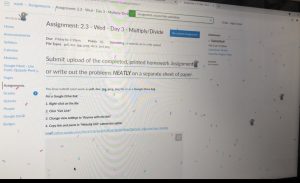By Madison Kitch

Covid-19 has affected everyone in some way– maybe it was quarantine, or maybe a family member got sick. No matter what, this pandemic has physically messed with all of us, but the long term mental effects of the Coronavirus are becoming more apparent every day. Between the lack of socialization and not being held accountable for work, many students are falling behind or feel hopeless when it comes to school.
“I personally do not like online school because I am not able to make the same connections with others as I used to,” sophomore Leahrose Schinzel said. “It’s not the same experience, and it’s harder to get things done.”
Learning virtually has affected everyone, but especially young kids. Missing out on face-to-face interactions can stunt social growth, and in some cases, even cause high-stress levels in young children. Elementary-aged kids are missing out on field days, class parties and so much more. Without the energetic and educational environment of a classroom, young kids are falling behind, not only in academics but also in learning how to socially interact. It’s also worth mentioning that neurodivergent kids and kids with learning disorders are struggling even more; many of them haven’t been taught which methods of learning work best for them.
This isn’t made any better by the fact that no one in class willingly turns their camera on. The lack of in-person interaction is bad enough, but many students keep their Google Account profile picture up during class. Sure, some teachers may make it extra credit and most strongly encourage it, but no one wants to be seen after they’ve just woken up. When the option to not be seen is there, students take it and don’t bother looking presentable. The feelings of embarrassment intensify for the one person who turns on their camera, no matter how presentable they are. Studies show that students would be much more comfortable if other people turned their cameras on too.
Luckily for introverted students, the Clark County School District has a ton of privacy rules and regulations regarding what exactly teachers can and can’t record. Teachers are only supposed to record a Google Meet if all students’ cameras are off, and these rules are especially strict because most students are minors; privacy laws regarding children aren’t exactly known to be slack.
That being said, CCSD isn’t the whole country. Schools in California go back and forth on the issue, with many districts being split. Some feel forcing a kid to keep their camera on during class is cruel; students come from all walks of life, and some may be ashamed or embarrassed about their home. Students with divorced parents may want to keep it on at one house, but not at the other; it’s a tricky situation, and forcing students to do anything they don’t want to do will only build resentment.
However, camera nerves don’t only affect students. The common lack of faces on screen can make teachers feel disconnected from their students, literally and figuratively. Without the feared webcam, teachers don’t know if a student is diligently working away or Facetiming a friend. The lack of engagement and speaking up is what upsets most teachers; teaching while looking at a bunch of icons isn’t the most rewarding.
“I personally feel that when +90% of students don’t show their faces, it can exacerbate feelings of isolation, or foster the feeling that school isn’t “real” anymore,” AP U.S. History teacher Mr. Aberman said. “Silently staring at avatars is probably not healthy. I don’t believe that simply turning on a camera is a magic solution to the problems of distance learning. I’m not that naive! However, it seems to me that students who are visible tend to be more engaged.”
Students all over the country are attending school virtually. Sometimes school is hard, but we can always look forward to seeing friends… except we can’t. While students may struggle with the embarrassment of their bedhead, that’s nothing compared to their feelings of isolation. Sure, it’s easy to talk to friends over text or Facetime, but random small talk with kids in class will be missed. It doesn’t help that it’s nearly impossible to meet new people in an online setting, especially for those already shy or reserved. Not having enough face-to-face interaction can lead to thoughts of anxiety or depression in kids and teens.
Not seeing classmates and teachers is temporary (this has to end eventually), but it’s led to some devastating long-term effects. 22 students have committed suicide in CCSD since March of last year, with the youngest being in fourth grade. CCSD was recently highlighted in national news for this disturbingly high count. These students didn’t get Covid-19, but it affected them and their families forever.
Having all students go back to school at once maybe isn’t the brightest idea, but there has to be a better way to combat these issues. Pre-K-3 are going back to some in-person learning starting March 1, which is a promising idea. In the meantime, sit tight, and maybe turn the camera on.
If you or someone you know is struggling, please find professional help or make an appointment with your counselor. The National Suicide Hotline Number is 800-273-8255.











